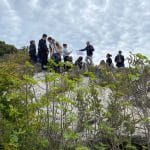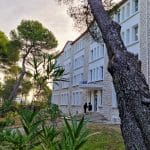Licence SVT, Earth course
The licence Life and Earth Sciences (SVT) of Aix-Marseille University offers several courses in the field of Earth, Marine, Environmental and Ecological Sciences.
The Life and Earth Sciences degree, which is highly multidisciplinary, enables students to acquire a foundation of academic knowledge and technical skills in various disciplines of the Earth and environmental sciences.
It offers a solid and modern training in connection with certain current themes - climate, environment, evolution, heritage, water and energy resources, geological risk - which can be further developed in different Masters courses.
The teacher-researchers involved in the Earth pathway mainly carry out their research activities at the CEREGE.
Target audience
- The Earth course is open to all students from the Louis Pasteur portal of Aix-Marseille University. For candidates from BTS, IUT, professional licences or L1 from other universities, applications must be submitted via the Aix-Marseille University eCandidat application.
The geological technician career pathThis programme is intended for second-year Life and Earth Sciences students who do not wish to pursue a long course of study and who wish to enter the private socio-economic sector after graduation.
Purpose and opportunities
- This course trains future multi-skilled senior technicians (or assistant engineers), capable of a reasoned approach to the field in order to take geological samples of all kinds (rocks, soils, water) and to carry out physical and chemical field measurements. The students of the course will therefore have acquired a basic theoretical knowledge in all areas of geology supported by a field approach developed during academic field schools but also periods in companies (internships and work experience).
- Although this is not the main objective of their training, they will also be taught laboratory techniques to enable them to better understand what is expected from their samples taken in the field. They should also be able to write, in French as well as in English, a precise report of the sampling, possibly reporting a first analysis resulting from the field observations.




